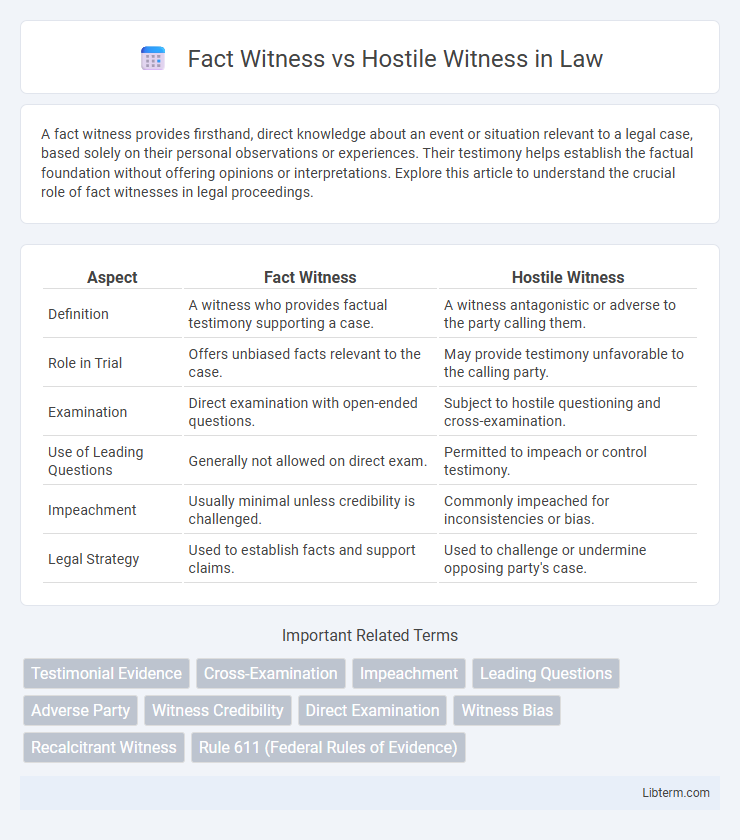A fact witness provides firsthand, direct knowledge about an event or situation relevant to a legal case, based solely on their personal observations or experiences. Their testimony helps establish the factual foundation without offering opinions or interpretations. Explore this article to understand the crucial role of fact witnesses in legal proceedings.
Table of Comparison
| Aspect | Fact Witness | Hostile Witness |
|---|---|---|
| Definition | A witness who provides factual testimony supporting a case. | A witness antagonistic or adverse to the party calling them. |
| Role in Trial | Offers unbiased facts relevant to the case. | May provide testimony unfavorable to the calling party. |
| Examination | Direct examination with open-ended questions. | Subject to hostile questioning and cross-examination. |
| Use of Leading Questions | Generally not allowed on direct exam. | Permitted to impeach or control testimony. |
| Impeachment | Usually minimal unless credibility is challenged. | Commonly impeached for inconsistencies or bias. |
| Legal Strategy | Used to establish facts and support claims. | Used to challenge or undermine opposing party's case. |
Introduction to Fact Witnesses and Hostile Witnesses
Fact witnesses provide firsthand testimony based on their direct knowledge or observations relevant to a case, serving as neutral sources of evidence. Hostile witnesses, though initially expected to support one party, demonstrate antagonism or unwillingness during examination, prompting attorneys to treat their testimony with heightened scrutiny. Distinguishing between these types is crucial for strategizing courtroom questioning and anticipating evidence reliability.
Defining a Fact Witness
A fact witness is an individual who provides firsthand information or direct evidence about events relevant to a legal case, based on their personal knowledge or observations. Unlike a hostile witness, who may exhibit antagonism or reluctance during testimony, a fact witness is generally expected to be cooperative and impartial. Courts rely on fact witnesses to establish the factual foundation of a case by offering testimony that is concrete, credible, and directly tied to the incident in question.
Characteristics of a Hostile Witness
A hostile witness displays antagonism toward the party that called them, often showing reluctance, evasiveness, or direct opposition during testimony. They may provide answers that contradict prior statements or evidence, making cross-examination necessary to challenge their credibility. Identifying a hostile witness allows the attorney to treat them differently procedurally, including leading questions to extract truthful or relevant information.
Legal Distinctions Between Fact and Hostile Witnesses
A fact witness provides testimony based on personal knowledge and is generally cooperative with the party that called them, offering factual information relevant to the case. A hostile witness, on the other hand, demonstrates hostility or adverse interest toward the party calling them, allowing that party to cross-examine the witness to challenge their credibility. Legal distinctions include the ability to impeach a hostile witness and the option to treat their testimony with skepticism due to potential bias or antagonism.
The Role of Fact Witnesses in Court
Fact witnesses provide direct, firsthand testimony about events or conditions relevant to a case, contributing critical evidence based on their personal knowledge. They differ from hostile witnesses who may be adverse or uncooperative, as fact witnesses aim to present objective and truthful accounts to assist the court's understanding. Their role is essential in establishing the factual foundation upon which legal arguments and judgments are built.
Handling Hostile Witnesses During Testimony
Handling hostile witnesses during testimony requires strategic questioning to control the narrative and maintain courtroom order. Lawyers must anticipate evasive or aggressive responses, employing leading questions and frequent objections to manage disruptions effectively. Mastery of courtroom rules and calming techniques ensures the hostile witness does not undermine the credibility of the case.
Rights and Responsibilities of Each Witness Type
A fact witness is obligated to provide truthful and accurate testimony based on their direct knowledge or observations, with the responsibility to assist the court in uncovering the facts. A hostile witness, despite initially cooperating, may demonstrate adversarial behavior, and the opposing counsel has the right to cross-examine them more rigorously to challenge their credibility. Both witness types have the right to legal protection against coercion or intimidation, and their testimonies must adhere to legal standards of evidence and relevance.
Strategies for Examining Fact vs. Hostile Witnesses
Examining a fact witness involves open-ended questions designed to elicit clear, chronological testimony that supports the case narrative, emphasizing their direct knowledge and credibility. In contrast, strategies for hostile witnesses focus on controlling the examination through leading questions to limit evasive or adverse testimony while challenging inconsistencies and impeaching their reliability. Utilizing documentary evidence and prior statements effectively undermines hostile witnesses, whereas fact witnesses require establishing trust and corroboration through detailed, spontaneous answers.
Legal Implications of Witness Classification
The classification of a fact witness versus a hostile witness significantly influences trial strategy and legal procedures, impacting how attorneys question the individual and the objections permitted during examination. Fact witnesses provide testimony based on direct knowledge or observation, while hostile witnesses are identified when their testimony contradicts the party that called them, allowing cross-examination methods typically reserved for opposing witnesses. Courts apply distinct rules regarding witness credibility, impeachment, and evidence admission based on this classification, which can affect the weight and reliability of testimony in determining case outcomes.
Conclusion: Impact on Trial Outcomes
The distinction between a fact witness and a hostile witness significantly influences trial outcomes by shaping the credibility and reliability of testimonies presented to the jury. Fact witnesses provide straightforward, often uncontested accounts that support case narratives, whereas hostile witnesses may introduce conflicting evidence that challenges a party's position, potentially undermining their argument. The strategic handling of hostile witnesses through impeachment or cross-examination can pivot the trial's direction, affecting verdicts and the overall efficacy of legal proceedings.
Fact Witness Infographic

 libterm.com
libterm.com